Other Events
2019
display:none;
Round table on Rethinking the Discourse on Women’s Economic Empowermen
Organised by: Centre for Gender Studies at the IHD, Bill and Melinda Gates Foundation (BMGF), and Initiative for What Works to Advance Women and Girls in the Economy (IWWAGE), During 61st Annual ISLE Conference
Date: 7 December 2019
Round table Participants: Bina Agarwal, Professor of Development Economics and Environment, Global Development Institute, University of Manchester; Former Director and Professor, Institute of Economic Growth, Delhi; Amit Basole, Associate Professor of Economics, Azim Premji University, Bangalore Amrita Datta, Assistant Professor, Indian Institute of Technology, Hyderabad Jayati Ghosh, Professor, Jawaharlal Nehru University, New Delhi; Renana Jhabvala, President, SEWA Bharat Soumya Kapoor, Head, Initiative for What Works to Advance Women and Girls in the Economy (IWWAGE), LEAD at Krea University; Govind Kelkar, Senior Advisor, Landesa, New Delhi; Sona Mitra, Principal Economist, Initiative for What Works to Advance Women and Girls in the Economy (IWWAGE), LEAD at Krea University; Indrani Mazumdar, Professor, Centre for Women’s Development Studies, New Delhi; Dev Nathan, Visiting Professor, Institute for Human Development, Delhi Subhalakshami Nandi, Deputy Regional Director, International Center for Research on Women (ICRW) Asia Office, New Delhi; Neeta Pillai, Acting Director & Professor, Centre for Women’s and Development Studies, New Delhi; Janine Rodgers, Visiting Sr. Fellow, Institute for Human Development, Delhi; Gerry Rodgers, Former Director, International Institute of Labour Studies, Geneva; Hema Swaminathan, Chairperson, Centre for Public Policy, Indian Institute of Management, Bangalore; Navsharan Singh, Senior Program Officer, Women’s Rights and Citizenship Program, International Development Research Centre, New Delhi Ravi Srivastava, Professor and Director, Centre for Employment Studies, IHD, Delhi Nisha Srivastava, Former Professor, Department of Economics, Allahabad University, Allahabad, Uttar Pradesh Padmini Swaminathan, Independent Researcher and Former Director, Madras Institute of Development Studies, Chennai; Dipa Sinha, Assistant Professor, School of Liberal Studies, Ambedkar University, Delhi; Nandita Gupta, Documentary Filmmaker; Jeemol Unni, Professor of Economics, Amrut Mody School of Management, Ahmedabad University; Aasha Kapur Mehta, Visiting Professor and Chairperson, Centre for Gender Studies, Institute for Human Development, Delhi; Tanuka Endow, Professor and Coordinator, Centre for Gender Studies, Institute for Human Development, Delhi
Moderators: Yamini Atmavilas, India Lead for Gender Equality, India Country Office, Bill & Melinda Gates Foundation Ritu Dewan, Vice President, ISLE; President, IAWS (2014-17)
Panel on Labour Codes and Women Workers’ Rights
Organised by: Indian Association of Women’s Studies (IAWS) and the ISLE; during 61st Annual ISLE Conference.
Date: 6 December 2019
Co-Chairperson: Dr. Ritu Dewan, Vice President ISLE, and Dr. Uma Rani, Senior Economist ILO Geneva, were the Co-Chairs.
Speakers and Presenters: Dr. Igor Bosc, Work in Freedom, ILO, and Dr. Indrani Mazumdar, Centre for Women’s Development Studies (CWDS), New Delhi; Dr. Anoop Kumar Sathpathy, VV Giri National Labour Institute, Noida; Professor Maya John, Jesus and Mary College, University of Delhi; Ms. AR Sindhu, Centre of Indian Trade Unions (CITU), New Delhi and Mr. Gautam Mody, New Trade Union Initiative (NTUI), New Delhi.
Discussant: Professor Ravi Srivastava, IHD Delhi
Panel on Preparedness of South Asian Countries for Addressing Labour Market Challenges in the Context of SDGs
Organised by: South Asian Network on Economic Modeling (SANEM), Dhaka and Institute for Human Development (IHD), Delhi ; During 61st Annual ISLE Conference.
Venue: Senate Hall
Date: 6 December 2019
Chairperson: Abhijit Sen, Former Member, Planning Commission and Former Professor, Jawaharlal Nehru University, New Delhi
Speakers and Presenters: Selim Raihan, Professor of Economics, Dhaka University and Executive Director, SANEM, Bangladesh ; Sarthi Acharya, Professor, IHD, Delhi; Puspa Sharma, Deputy Executive Director, South Asia Watch on Trade Economics and Environment (SAWTEE), Kathmandu, Nepal
Discussant: Nomaan Majid, Senior Employment Specialist, Decent Work Technical Team – South Asia, International Labour Organization, New Delhi
Panel on Labour Market Inequality and Policies
Organised by: Centre for Employment Studies and Institute for Human Development, Delhi; During 61st Annual ISLE Conference.
Date: 9 December 2019
Moderator: Ravi Srivastava, Professor and Director, Centre for Employment Studies, IHD, Delhi 40 Speakers and Presenters: Imaraan Valodia, Dean, Faculty of Commerce, Law & Management, University of Witswatersrand, Johhannesberg and Dr. David Francis, Research Manager: Southern Centre for Inequality Studies Wits University; K. P. Kannan, Chairman, Laurie Baker Centre for Habitat Studies and Hon. Fellow, Centre for Development Studies, Trivandrum; Jeemol Unni, Professor, Ahmedabad University; Jens Lerche, School of Oriental and African Studies, London; Himanshu, Associate Professor, Jawaharlal Nehru University, New Delhi
Discussant: Gerry Rodgers, Visiting Professor, Institute for Human Development, Delhi and Former Director, International Institute of Labour Studies, Geneva.
2018
display:none;
Policy roundtable on Inequality and Marginalities: Towards an Inclusive Labour Market,
Date: 7 December 2018
The roundtable was organised by the Institute of Human Development (IHD), Delhi and the Programme of Research on Inequality and Poverty, Department of Anthropology, London School of Economics, UK. It discussed the policy implications of research carried out across India by the Programme of Research, published in the book Ground Down by Growth: Oppression, Discrimination and Exploitation of Adivasis and Dalits in 21st century India (OUP India, 2018).
The implications of the study were shared and discussed with around 40 participants representing the trade unions, workers’ organisations, concerned civil society organisations, and academics working in related areas. Policy recommendations for the ILO, regarding the implementation of ILO Conventions C111 on Discrimination (Employment and Occupation) and C107 on Indigenous and Tribal Populations Convention, 1957, to which India is a signatory were also discussed in the Policy roundtable. At the roundtable, Dr Alpa Shah (LSE), Dr Jens Lerche (SOAS) and Professor Ravi Srivastava (IHD) presented the findings and policy recommendations of the research programme. This was followed by discussion between all participants. Dr. Dev Nathan, Visiting Professor, IHD chaired the proceedings of the policy roundtable.
The Institute organised the following panels during the Conference:
PANEL on Inequalities: A Southern Approach
Organised by: Southern Centre for Inequality Studies, Wits University, South Africa and Institute for Human Development (IHD), Delhi, during the 60th Annual ISLE Conference
Date: 18 December 2018
Chairperson: D. Narasimha Reddy, Visiting Professor, IHD and former Professor of Economics, University of Hyderabad
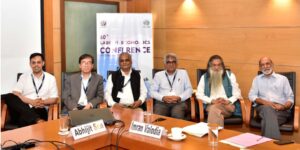
Speakers and Presenters: Imraan Valodia, Dean, Faculty of Commerce, Law and Management, University of Witwatersrand, Johannesburg; Alakh N. Sharma, Director, Institute for Human Development and Editor, Indian Journal of Labour Economics; David Francis, Imraan Valodia and Eddie Webster, Southern Centre for Inequality Studies, Faculty of Commerce, Law and Management, University of Witwatersrand, Johannesberg; Aroop Chatterjee, Research Manager, Southern Centre for Inequality Studies, Faculty of Commerce, Law and Management, University of Witwatersrand, Johannesberg; Li Shi. Professor, Department of Economics, Business School, Beijing Normal University, China; K. P. Kannan, Honorary Fellow, Centre for Development Studies, Trivandrum, and Chairman, Laurie Baker Centre for Habitat Studies, Trivandrum; S. Madheswaran, Professor and Head, Centre for EconomicStudies and Policy Institute for Social and Economic Change, Bangalore and B.P.Vani, Center for Economic Studies and Policy, Institute for Social and Economic Change, Bangalore
Discussant: Abhijit Sen, Former Member, Planning Commission and former Professor, Jawaharlal Nehru University, New Delhi
PANEL on Care and Labour Market (Dedicated to the memory of Dr. Preet Rustagi)
Organised by: Centre for Gender Studies, Institute for Human Development in collaboration with International Development Research Centre (IDRC), Canada. During the 60th Annual ISLE Conference
Date: 20 December 2018
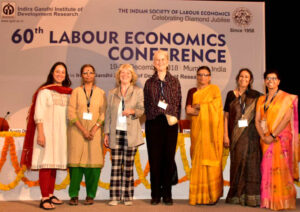
Chairperson: Dr. Alaka Basu, Professor, Department of Development Sociology, Cornell University, Ithaca, NY, USA Special Lecture by: Nancy Folbre, Professor Emerita, Department of Economics, University of Massachusetts,USA
Speakers: Francesca Bettio, Professor, Department of Economics, University of Siena, Italy; Eleonor Faur, Professor, Institute for Higher Studies on Social Sciences, National University of San Martín, Argentina; Deepta Chopra, Research Fellow, Institute of Development Studies, University of Sussex, UK; Padmini Swaminathan, Visiting Professor, Council for Social Development Hyderabad; Former Professor and Director, Madras Institute of Development Studies (MIDS), Chennai.
PANEL on Growth and Employment in Emerging Economies: Perspectives and Policies
Organised by: Centre for Employment Studies, Institute for Human Development, Delhi. During the 60th Annual ISLE Conference
Date:
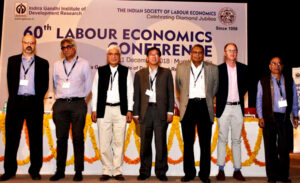
Chairperson: Deepak Nayyar, Professor Emeritus, Jawaharlal Nehru University and former Vice‐ Chancellor,University ofDelhi
Speakers : Francisco H.G. Ferreira, Senior Advisor, Development Research Group, The World Bank, Washington; Li Shi, Professor of Economics, Business School, Beijing Normal University, Beijing; Sudipto Mundle, Emeritus Professor, National Institute of Public Finance and Policy, New Delhi; Imraan Valodia, Professor, Faculty of Commerce, Law and Management, University of the Witwatersrand, Johannesburg
PANEL on Growth and Employment in Emerging Economies: Perspectives and Policies
Organised by: Centre for Employment Studies, Institute for Human Development, Delhi. During the 60th Annual ISLE Conference
Date:

Chairperson: Deepak Nayyar, Professor Emeritus, Jawaharlal Nehru University and former Vice‐ Chancellor,University ofDelhi
Speakers : Francisco H.G. Ferreira, Senior Advisor, Development Research Group, The World Bank, Washington; Li Shi, Professor of Economics, Business School, Beijing Normal University, Beijing; Sudipto Mundle, Emeritus Professor, National Institute of Public Finance and Policy, New Delhi; Imraan Valodia, Professor, Faculty of Commerce, Law and Management, University of the Witwatersrand, Johannesburg
2017
display:none;
Book Releases Growth and Inequality: The Contrasting Trajectories of India and Brazil
Editors: Alexandre de Freitas Barbosa & Maria Cristina Cacciamali & Gerry Rodgers
Publisher: Cambridge University Press India
Date of Launch in Delhi: 12th December 2017
Date of launch in Thiruvananthapuram: 17th December 2017
The research project on “Labour Market Inequality in Brazil and India” was a comparative study, which was carried out by CEBRAP, São Paulo and the Institute for Human Development, New Delhi, with support from IDRC. The study was undertaken by a group of researchers from both Brazil and India, with support and advice from several distinguished scholars who had been working in this field in the two countries. The book, “Growth and Inequality: The Contrasting Trajectories of India and Brazil” has been one of the most significant deliverables of the project. Two launch events were organised for the publication. The details are as follows:
Launch in Delhi:
The book was released on 12thDecember, 2017 which was followed by a panel discussion chaired by Prof. Yoginder K. Alagh. The panelists included Dr. Nitin Desai, Prof. Deepak Nayyar and Prof. Bina Agarwal.
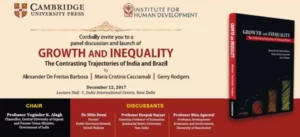
Launch in Thiruvananthapuram:
The book was launched in Thiruvananthapuram during 59th Annual ISLE conference organized on 17thDecember, 2017 amidst the gathering of policy makers, researchers, professionals and other experts both from India and abroad. The main editor of the book, Gerry Rogers, made a brief presentation of the book followed by book release by Dr. S. Mahindradev, Director and Vice Chancellor, Indira Gandhi Institute of Development Research.
Round Table on Universal Basic Income in India
Date and Venue: 10th July 2017, New Delhi
The Institute for Human Development (IHD) with support from the International Labour Organisation (ILO) organised a Round Table on “Universal Basic Income: Emerging Perspectives” at the India International Center on 10thJuly, 2017. Over 80 delegates participated in the discussions comprising of senior academics, bureaucrats, and researchers from India and abroad. Professor Bibek Debroy, Member, NITI Aayog delivered the inaugural speech and the keynote address was delivered on behalf of Dr. Arvind Subramanian, Chief Economic Advisor, Government of India. The leading proponents of the Universal Basic Income (UBI), Prof. Pranab Bardhan and Prof. Vijay Joshi also participated in the Round Table and presented their versions of UBI. The deliberations during the day-long event largely focused on conceptual issues and aspects of design and implementation of Universal Basic Income (UBI). While much of the discussion centered around practical, financial, and political feasibility of this measure, it was nonetheless contextualized within broader philosophical and ethical concerns. The concept of Universal Basic Income has gained traction in recent times although the motivation driving these discussions differs across countries and regions. In the developed countries, discussions and conceptualization of the policy happens in terms of future of working or employment. Concerns in developing countries like India differ considerably. In the Indian context, concerns of poverty alleviation, inequality, the necessity of bringing deprived population under a social security net, and the fiscal feasibility of such a policy have guided deliberations. The main technical sessions in the Round Table deliberated on three main proposals, namely, the Bardhan Proposal, the Joshi Proposal, and the Economic Survey Proposal. Professor Bardhan argued that implementation of a policy like UBI has a sound ethical and political basis and has over time generated support across the ideological spectrum. Professor Joshi’s proposal similarly argued for a universal UBI policy. His concerns however, were located in need for such a measure as an essential aspect of the ongoing economic reform and rationalization of public expenditure. The Economic Survey Proposal advocated a quasi universal scheme while advocating the need for such a programme, and nevertheless concluded that its implementation in the current context is infeasible. Concluding the Round Table deliberations, Professor Mundle stressed on the need for “small and gradual steps” before adopting the policy. The general agreement was that there is need for more clarity on the idea and feasibility of UBI in India. They suggested that experiments and pilot projects in selected regions or for selected population would be useful. In this context, Professor Alakh Sharma proposed a pilot programme for implementing UBI for the old age citizens which is fiscally feasible currently.
Symposium on Migration and Development
Date: 15th December, 2017
This is an events organized by the Institute during the 59th Annual Conference of ISLE. The pre-conference event was organized by the Institute for Human Development, Delhi with support from International Labour Organisation (ILO). The theme presentation was made by Professor Ravi Srivastava from CSRD, JNU, New Delhi. Professor, Deepak Nayyar, Former Vice Chancellor, University of Delhi chaired the session. The Panelists included Max Tunon (Migration Specialist, International Labour Organization (ILO)), D. Narayana (Director, Gulati Institute of Finance and Taxation (GIFT) Thiruvananthapuram and Organising Secretary 59thAnnual ISLE Conference), Neeraj Kaushal (Professor, Columbia University) and S. Chandrasekhar (Indira Gandhi Institute of Development Research (IGIDR) Mumbai). The panelists discussed various migration indicators and its impact on development.
Panel Discussion on the Regional Dimension of Labour Market and Inequality
Date: 16th December,2017
This is an events organized by the Institute during the 59th Annual Conference of ISLE. The panel discussion took place on “The Regional Dimension of Labour Market and Inequality” on 16th December, 2017. It was coordinated by Dr. Gerry Rogers, Visiting Professor, IHD, Delhi and Former Director, Institute of Labour Studies, Geneva and the session was chaired by Ravi Srivastava, Professor, Centre for Study in Regional Development. The panelists included Gerry Rodgers (Visiting Professor, IHD, Delhi and Former Director, Institute of Labour Studies, Geneva), Jeemol Unni (Professor, Amrut Mody School of Management Ahmedabad University, Ahmedabad), A.V.Jose (Professor, GIFT, Thiruvananthapuram), Yiu Por (Vincent) Chen (Visiting Professor, School of Global Policy and Strategy, University of California, San Diego) and Amitabh Kundu (Visiting Professor, IHD, Delhi and Former Professor, JNU, New Delhi) The following aspects were addressed in the session:
- Defining regions in India: how can the diversity of regional experience be best captured through identifying regions with different characteristics?
- The growth of the metropolis and its implications for inequality
- Regional patterns of deprivation – the cases of Scheduled Tribes and of Muslims
- Regional policy and its effectiveness in reducing regional inequality
Round Table Discussion
Meeting the Employment challenge in South Asia and release of the book, “Employment, social Protection and Inclusive Growth in south Asia”, edited by Dev Nathan and Akhilesh K. Sharma and published by South Asia Press and IHD under SARNET.
Date: 16th December 2017
This is an events organized by the Institute during the 59th Annual Conference of ISLE. The round table discussion took place on 16thDecember, 2017. The event was chaired by Deepak Nayyar, President, Indian Society of Labour Economics and Former Vice-Chancellor, University of Delhi. The panelists included Amb. Dago Tshering (Former Ambassador of Bhutan to India), K.J. Joseph (Professor, Centre for Development Studies, Thiruvanathapuram), Nomaan Majid (Senior Employment Specialist, Decent Work Technical Team – South Asia, ILO), Prakash K. Shrestha (Director, Nepal Rashtra Bank Kathmandu, Nepal), Dilli Raj Khanal (Founder Chairman, Institute of Policy Research and Development (IRPAD), Kathmandu, Nepal), Rizwanul Islam (Former Special Adviser, Employment Sector International Labour Office, Geneva), Selim Raihan (Department of Economics, University of Dhaka & Executive Director, SANEM, Dhaka, Bangladesh), Md.Muqtada (Former 66 Director Policy Planning & Employment Sector ILO, Geneva), Ganga Tilakratna (Research Fellow, Institute of Policy Studies, Sri Lanka)
Panel Discussion on Fourth Industrial revolution and Employment
Date: 18th December, 2017
This is an events organized by the Institute during the 59th Annual Conference of ISLE. The panel discussion was organised by the Centre for Alternative Development, Ahmedabad and IHD, Delhi. The event was chaired by Indira Hirway, Director, and Centre for Development Alternatives, Ahmedabad. The Panelists included Johann Ivanov (Deputy Representative and Program Director, Social Justice FriedrichEbert-Stiftung (FES), India Office), N.S. Siddharthan (Director, Forum for Global Knowledge Sharing and Hon. Professor of Economics, Madras School of Economics Chennai), Ajit Ranade (Chief Economist, Aditya Birla Group), Keshab Das (Professor, Gujarat Institute of Development Research Ahmedabad) and Gaurav Nayyar (Senior Economist, Trade & Competitiveness, Global Practice, The World Bank). The panelists shared their view points on the adoption of new process technologies and the general questions for developing countries and its importance.
2016
display:none;
Multi-Stakeholder Consultation on Policy Options for Domestic Work in the Context of India’s Care Economy, New Delhi
Organisers: Institute for Human Development and International Labour Organization
Date & Venue: 4 April 2016, New Delhi
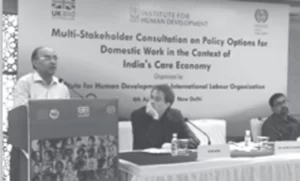
The Institute for Human Development (IHD) and the International Labour Organization (ILO) jointly organised a Multi-Stakeholder Consultation on “Policy Options for Domestic Work in the Context of India’s Care Economy” in New Delhi. This was part of the ‘Work in Freedom’ programme, a UK funded multi- stakeholder initiative to reduce vulnerability of people involved in forced labour with a special focus on domestic work.
The objective of the Consultation was to discuss and debate issues around domestic work in India and suggest suitable strategies and policies to move towards decent work for women domestic workers. A number of experts from various fields- academicians, employers, recruitment agencies, trade unions, government & international organisations and development practitioners, participated in the conference. The Inaugural Addresses of the consultation was delivered by Mr. Manish Gupta, Joint Secretary, Ministry of Labour and Employment. This one-day meeting included the presentation of the findings of a research study, conducted by IHD in collaboration with Centre for Development Research and Action (CDRA), Mumbai and supported by ILO. The presentation on, ‘Employers of domestic workers’ based on a large survey in Delhi and Mumbai, was followed by four sessions of panel discussions, where experts commented on the various dimensions of the study. The following were the main points raised at the consultation-
- The study reinforced the need to recognize domestic work as a legitimate labour market activity
- It urged for the regulation of its different aspects such as recruitment, contracts, identity/ security checks, workers basic rights, and so on
- It was felt that the employers’ perspectives regarding domestic work, women workers, wage returns, hiring mechanisms, preferences, needed to be examined
- Policy makers should ensure the protection of the dignity of women domestic workers and ensure decent work for them
The event stimulated in-depth discussions on the way forward, which represented an important input into realizing the goal of ‘Decent Work for Domestic Workers’. The consultation provided critical inputs for ongoing efforts relating to policy and action.
Panel Discussion on edited book "Labour in Global Value Chains in Asia"
Organisers: IHD along with the India International Centre
Date: 2 December 2016, New Delhi
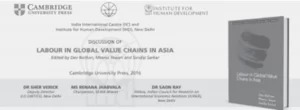
The Institute for Human Development, New Delhi and the India International Centre organised a discussion on the Book “Labour in Global Value Chains in Asia”. The book, edited by Dev Nathan, MeenuTewari and Sandip Sarkar has been published by Cambridge University Press.
The book is a case study of labour in global value chains, and out-sourced production, in a number of sectors. These sectors range from lowknowledge and labour-intensive segments, such as garments, agro-foods and tourism, mediumknowledge segments- automobile and electronic hardware to high knowledge segments- IT, software services. The case studies cover a number of countries- like Bangladesh, Cambodia, China, India, Indonesia, Sri-Lanka and Vietnam. The book tries to identify spaces for progressive action and policies in the current laissez-faire GVC-linked global environment.
Professor Dev Nathan, Visiting professor, IHD introduced the book at the event. This was followed by presentations by the editors of the book. A panel discussion was also held at the event where panellists including Renana Jhabvala, Chairperson, SEWA Bharat addressed the gathering and presented their thoughts on the issues the book highlights.
Some of the impressions that were articulated at the panel discussion included that of Professor Jhabvala, who found the book enlightening and said that the book provides conceptual clarity to the analysis (of labour in GVCs). Dr. Sher Verick, Deputy Director, ILO, New Delhi said that the topic of labour standards in GVCs is something that is important for the ILO, and this book contributes substantially to that discussion.
The Panel Discussion was chaired by Professor Deepak Nayyar, Emeritus Professor, Jawaharlal Nehru University.
The panellists endorsed the book as a work that will set the framework for the analysis of labour issues in GVCs for some time to come. It was also noted that the book is an example of careful empirical work; which the writers use to draw stylized facts, and build an analytical structure.
Special Session on “Macro-Economic Impact of MGNREGA in India: An Analysis in CGE Modeling Framework”
Organiser: Institute for Human Development, New Delhi
Date &Venue: 26 November 2016,IIT, Guwahati
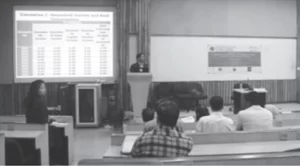
The session was organised during 58th ISLE Conference and was based on the key findings of a study conducted by IHD, New Delhi on the macroeconomic impacts of MGNREGA in India, the study was conducted with support from Partnership for Economic Policy (PEP).
The presentation on the study was made by Dr. Akhilesh Sharma, Faculty, IHD. The session was chaired by Ms. Aparajita Sarangi, Joint Secretary, Ministry of Rural Development, Government of India. Noted economists and experts like Professor Abhijit Sen of JNU, Professor D N Reddy, Visiting Professor, IHD, Dr. Sher Verick , Deputy Director, ILO DWT/CO, India, Professor Atul Sarma, Chairman of OKDISCD, Guwahati and Visiting Professor, IHD, Mr. J D Ekka, Commissioner, Deaprtment of Rural Development and Panchayati Raj, Government of Assam and others participated in the panel discussion and enriched its deliberations.
The main points of discussion at the Session were the following-
The main findings of the study were highlighted such as MGNREGA’s positive impact on real GDP at basic prices, GDP at basic prices, wage rate of the semi-skilled labour, supply of unskilled labour, households income, real consumption budget of households, demand for composite labour, and imports of products
- The study recommended MGNREGA over alternative policy scenarios that are not beneficial to the economy as well as households income, particularly the poor
- The limitations of CGE modelling particularly assumptions about closures and parameters in the model was acknowledged but its merit as an approach to analyse policies at the macro level and discerning external shocks to the economy were given credit
- It was suggested that a few more counterfactuals like cash transfer schemes, expenditure on Pradhan Mantri Gram Sadak Yojana and National Rural Livelihood Mission can be added in the study
- Suggestions for improving the model were made by incorporating the mobility of capital across the sectors and disaggregation of capital between land and capital
- The limitations of the CGE model in capturing the institutional aspects and implementation issues were also raised
- Incorporating dynamic CGE model for bringing out better policy implications was also suggested
2015
display:none;
Panel Discussion on ‘Minimum Wages’
Organiser/s: In collaboration with CEBRAP under the auspices of the IDRC‐funded research project on Labour Market Inequality in Brazil and India
Date and Venue: 11 October 2015, Srinagar
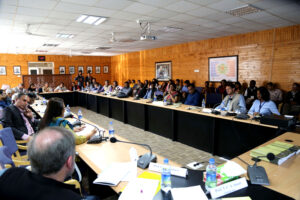
A panel discussion on Minimum Wages was jointly organised by IHD‐CEBRAP under the auspices of the IDRC‐funded Research Project on Labour Market Inequality in Brazil and India, During the 57th Annual ISLE Conference. The panel was chaired by Prof. T.C.A. Anant, Chief Statistician and Secretary, Ministry of Statistics and Programme Implementation, Government of India. It was jointly coordinated by Gerry Rodgers, Visiting Professor, IHD and Dr. Uma A. Rani, Senior Economist, ILO, Geneva.
A policy review of minimum wages was also conducted under the project, and a working paper was made available to participants.
The panelists presented some of their key findings in the Panel Discussion‐
- Uma Rani presented some of her key findings on the issue of coverage and compliance of minimum wages, particularly in India, along with an international comparison.
- Gerry Rodgers discussed the history of the minimum wage and argued that inequality in Brazil had reduced significantly from the late 1990s and the research suggested that 1/3rd of the reduction in inequality could be attributed to minimum wage.
- P.P. Mitra presented the government’s view on minimum wages and answered the issues raised by Dr. Rani in her presentation, namely on coverage, method of fixation and enforcement of minimum wages.
- Gautam Mody spoke about the trade unions’ perspectives on the issue of minimum wage violations and the role of the state.
- Jeemol Unni drawing from some of her previous studies on workers in the informal sector in Ahmadabad stated that in a perfectly competitive market with complete enforcement, minimum wages would reduce employment. However, in a biased market, minimum wages with perfect enforcement could increase wages up to a point but they would then decrease.
- Arjan de Haan from IDRC concluded by detailing the IDRC funded comparative research that enables learning from other countries’ experiences.
- The Panel Discussion was followed by comments and discussions from and with the
Panel Discussion on Highlights of Draft India Employment Report (IER) ‐ 2016
Organiser/s: under the auspices of SARNET (A research and Network Programme promoted by IHD in collaboration with ILO and UN ESCAP with support from IDRC, Canada). During the 60th Annual ISLE Conference
Date and Venue: 9 October 2015, Srinagar
The session was chaired by Professor Abhijit Sen, Professor, Jawaharlal Nehru University and Former Member Planning Commission. The objective of the panel discussion was to address the challenges facing the country with respect to employment and job creation in the present circumstance.
Professor Ajit Ghose, Visiting Professor, IHD, presented some of the key points of the draft India employment report. Dr. Ghose laid down the employment challenges at the current juncture where an estimated 15 million new productive jobs were required every year.
The methodological implications of the estimated labour and workforce projections and the challenges faced by researchers while trying to gauge the changes in employment conditions (like the absence of social security nets that leads to disguised, unrecorded employments) were discussed by the panelists. Another key point that Professor Ghose talked about was how it is misleading to talk about “jobless” or “job‐rich” growth in the context of the Indian economy. To understand employment condition, the focus needs to be on the structure of employment, underemployment and productivity, and the changes in wages as indicators of job quality and earnings. The trends of declining female labor force participation and the proportionately higher percentages of surplus female labor force were also presented.
The following were the highlights and the questions that were raised at the discussion with respect to the draft report:
- The question as to whether it would be possible to look at the formal‐informal divide not as a two‐ sector model but as a multi‐sector model was raised
- It was felt by the panelists that exogenous wages need to be examined more carefully
- The inverse relationship between employment intensity and productivity in understanding the growth employment relationship needed to be examined more carefully
- It was noted that the present report was substantially different in that it presented facts in a specific way and was substantively evaluative in nature
- The need to explore the factors behind the emergence of both the good and bad drivers of the current global trajectory was stressed
- The concept of labour market equilibrium and whether it could be considered endogenous was raised
- The issue of the discrepancy between census data and National Social Survey (NSS) data in determining the nature and extent of the decline in female labour participation rate was also raised
The discussions pointed towards the need to consider labor in itself as being as important as these complexities of macro‐economic employment conditions for an extensive employment report.
Panel Discussion on Organising Women Workers
Organiser/s: in collaboration with Indian Association of Women Studies (IAWS). During the 60th Annual ISLE Conference
Date and Venue: 12 October 2015, Srinagar
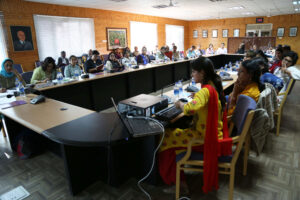
The first presentation was by Ms. Reiko Tsushima, Senior Gender Specialist, International Labour Organisation (ILO), who spoke on ‘Challenges confronting Trade Unions in organizing women workers’. She noted the sharp increase in female Trade Union membership across all unions was due mainly to the increased unionisation of agricultural and rural workers.
She critically engaged with the limitations of class‐based industrial relations theorizing and the inability of class analysis to uncover the specificity of women’s experiences in Trade Unions. After discussing various issues that women workers encountered, she suggested some desirable changes‐
- Address the crisis of NSFE and its fragmenting, bargaining base as a reality
- Effectively address women workers’ interests
- Defamiliarisation of care—from the family to the state and then the market
- Enhance women’s income, their ability to establish autonomous Households and to leave oppressive relationships
- De‐gender‐care work by redistributing care roles from women to men
- Re‐evaluate the value of care related jobs and
- Secure universal social protection that does not depend on being in
Ms. Kiran Moghe Vice President, IAWS, and All India Democratic Women’s Association (AIDWA), spoke on ‘Strategies for Organizing Domestic Women Workers’ and her experiences in organizing domestic workers in Pune under the banner of the Pune Zilla Gharkamgar Sanghatana (Pune District Domestic Workers Union) affiliated to the Centre of Indian Trade Unions (CITU). She pointed out the role of the Central Trade Unions in building national struggles around the national and state level laws for the regulation of working conditions of paid domestic workers.
Dr. Kalpana K., Assistant Professor, Department of Humanities and Social Sciences, Indian Institute of Technology, Madras, addressed an existing paradox. On the one hand, authorities prohibit certain women’s organisations (such as Trade Unions in garment factories), and on the other, endorse and promote others (such as micro finance groups).
In response to the presentations, the following questions and issues were raised by the commentators‐
- Challenges arising due to women moving towards unpaid labour with the falling female workforce participation was highlighted
- The struggles of the rural peasantry, the acquisition of natural resources and the issue of land acquisition was raised
- The absence of feminist perspectives and analyses on care, which are recognised as important in countering the dominance of markets, in the mainstream economic enquiry was highlighted
- The question of the role of NGOs in creating a niche for different types of workers, from domestic workers to Anganwadi workers to the SHGs, was raised
- The issue of sexual harassment in the workplace and how it is dealt with was also raised
TRAINING PROGRAMMES 2014
display:none;
2nd SARNET Training Programme for Young South Asian Scholars on 'La- bour Economics: Theories, Methodologies and Research Issues’
Organisers: IHD under the auspices of SARNET
Date and Place: 2-13 December 2014, New Delhi
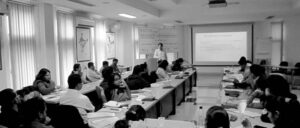
The 2nd SARNET Labour Economics Training was organized by IHD and the ILO as part of the South Asia Research Network on Employment and Social Protection (SAR- NET) initiative, which is a collaboration of IHD, ILO with the United Nations Eco- nomic and Social Commission for Asia-Pacific (ESCAP) with support from International Development Research Centre (IDRC), Canada.
The call for the training programme received overwhelming response from Bangladesh, Nepal, Sri Lanka, Pakistan, Afghanistan, Myanmar, Maldives and all over India. Alto- gether out of 112 applicants, 30 were chosen. The main objectives of the programme were:
- to provide an in-depth understanding of the key theories of and emerging issues in labour markets and labour institutions, econometric techniques and research meth- odologies;
- to elucidate the linkages between growth, structural transformation and employment along with earnings, inequality and labour market segmentation and
- to promote research on labour economics in South Asia and to foster partnerships among young academics across the
The 11-day course was based on lectures by distinguished Indian and international experts coordinated by Dr. Sher Verick of ILO. A special lecture on Global Value Chains and Labour titled ‘The Who, Why and When of Decent Work’ was delivered by Profes- sor Raphael Kaplinsky from Open University, UK.
Training Programme on ‘Project Proposal Writing, Drafting of Research Reports/Papers and Presentation Skills’
Organisers: IHD (Institute for Human Development)
Date and Place: 21-23 December 2014, Ranchi
IHD Eastern Regional Centre organised a Training Course for Young Scholars on Project Proposal Writing, Drafting of Research Reports/Papers and Presentation Skills which was directed by Professor J. Krishnamurty, Visiting Professor at the IHD.
15 young researchers, scholars and students from the States of Jharkhand, Bihar, West Bengal & Odisha participated in the workshop which received very positive feedback from the participants. To build and enhance capabilities and expertise on project propos- als, the programme was designed as follows.
- Day I focussed on drafting skills, followed by mind-mapping exercises and revision of short research papers based on the
- Day II was devoted to the important aspects of proposal
- Day III discussed presentation skills and included group-presentations based on research
BOOK RELEASES
display:none;
Regional Launches of India Labour and Employment Report 2014
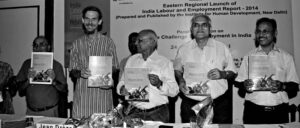
Southern Region Launch of India Labour and Employment Report 2014
29 August 2014, Hyderabad
The India Labour and Employment Report 2014 was prepared by IHD and the Indian Society of Labour Economics, with support from IDRC, Canada. It was released by the Eminent Economist and Chancellor, University of Hyderabad, Professor C. H. Hanu- mantha Rao. Professor R. Radhakrishna, Chairman, Centre for Economic and Social Studies chaired the session. The launch was organised by Institute for Human Develop- ment, New Delhi and CSD, Hyderabad
Eastern Region Launch of India Labour and Employment Report 2014
24 June 2014, Ranchi
The India Labour and Employment Report 2014 prepared by IHD and the Indian Society of Labour Economics was released by Professor L. N. Bhagat, Vice-Chancellor, Ranchi University. The release of the report was followed by a panel discussion on ‘The Challenge of Employment in India’ between academicians and policymakers. The panel deliberations mainly focussed on the ongoing anti-encroachment and cleanliness drive in the city and its impact on the earning potential of the displaced.
Release of Mizoram Human Development Report
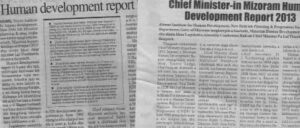
3 July 2014, Aizawl, Mizoram
Mizoram Human Development Report 2013, prepared and published by IHD for the Government of Mizoram was the first ever Human Development report of Mizoram. In the opening remarks, the Chief Secretary of Mizoram pointed out that the report places people at the center of the development process in terms of economic debate, policy and advocacy. The Chief Minister of Mizoram congratulated IHD for the commendable report, a milestone against which Mizoram’s achievements, as well as its future develop- ment goals and aspirations would be measured. He emphasised that the Report has pro- vided a roadmap and chalked out a strategy for a broad-based and sustainable economic growth, based on its past achievements of high level human development. The notewor- thy and distinguishing features and recommendations of the report are
In addition to available secondary data, the report is based on primary data collected from a large sample of 3670 households, drawn from both the rural and urban areas in all the districts of the state;
- Calculation of Human Development Index (HDI),Gender Development Index (GDI) and the Gender Parity Index (GPI) for various districts of the state;
- Analysis of the issues of governance and other challenges for enhancing and sustain- ing higher levels of human development in the state and
- The need for Mizoram to follow the ‘high road’ to development that calls for long- term investments, high levels of skill and knowledge formation, high technological base, modern forms of organization, professional management and
The vote of thanks was given by Special Secretary of Planning, Mizoram.
Release of ‘What after MDGs? Shaping the Development Agenda in the Post-2015 Scenario: Think Pieces from the Global South’
28 April 2014, New Delhi
IHD with Wada Na Todo Abhiyan brought out a publication to contribute to the discus- sion on the Post- Millennium Development Goals 2015 titled ‘What after MDGs? Shap- ing the Development Agenda in the Post-2015 Scenario: Think Pieces from the Global South’. The volume contained perspectives and insights of leading academic scholars and experts from the Global South. The draft volume of ‘Think Pieces’ was presented to the UN Secretary General’s office, UN General Assembly and widely circulated among National and International stakeholders. The book was released in the inaugural session of the International Symposium on ‘Human Development in Global South: Emerging Perspectives in the Era of Post- Millennium Goals’ by the UN Resident Coordinator and UNDP Resident Representative.
